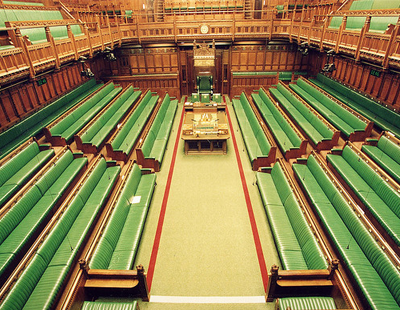
A survey by The Tenancy Deposit Service suggests that half of landlords have experienced damage to their rental properties by pets.
And it warns that a spike in pet ownership during the Coronavirus crisis has led to an increased risk of damage to rental properties.
The survey, which involved some 1,500 landlords, also found that 70 per cent feel that tenants should not automatically be allowed to keep a pet in a rental property.
Despite that, 82 per cent of landlords still allow tenants to keep a pet in their rental.
The poll, which involved 1,500 landlords, also showed that two thirds would want to be able to raise the rent if they were forced by law to allow their tenant to keep a pet in their property.
However - with pet deposits banned as part of the Tenant Fees Ban - just over half of landlords surveyed said they would be prepared not to raise the rent if pet deposits were reinstated.
Prior to the ban being introduced in June 2019, a third of landlords asked their tenants for an additional pet deposit. Only four per cent charged a higher rent and 63 per cent did neither.
According to the veterinary charity PDSA, half of UK adults own a pet. Nearly 11m are cat owners and 9.9m own a dog.
“There is a potential conflict here between pet ownership among tenants and landlords who are concerned about the impact of animal damage. The issue is that landlords are unable to introduce additional fees because of the Fee Ban” explains TDS chief executive Steve Harriott.
“We want to know what people think about this. Do they want pet deposits reinstated or could rents be raised to cover any additional costs that may be incurred for a renter keeping an animal at the property?
“Our findings show there is an ongoing debate on this issue, but until it’s finalised, we recommend all tenants are open and honest when it comes to their pet ownership and communicate with their landlord so a compromise between both parties can be sought.”













%20-%20IMAGE%20Client%20Accounting%20%E2%80%93%20what%20are%20your%20options.jpg)

.png)








Join the conversation
Jump to latest comment and add your reply
Pets can cause immense damage in a very short space of time, particularly when owned by irresponsible tenants. Having said that I never objected to pets before the fee ban but now wouldn't entertain an applicant with a pet. A 'pet deposit' may only cover part of the damage cost (if there is any) but it was something. Now it's no deposit, no pet.
I've just done an inventory check out for a very decent landlord, the Reception room has a large brown stain to the bay window and similar in bedroom 2, the cleaners tell me it is animal in origin and the tenants had pet rabbits... the staining is both very prominent and permanent... the carpets were in good nick but now need replacing but the landlord will get nowhere near the actual cost of damage to his well maintained property, perhaps its time for pets to have their own tenancy agreement and separate deposit...
The first paragraph in this article is a statement of the bleedin obvious.
I reckon that the 'half' of landlords will reduce over time as more and more come to realise that agents have been recommending no pets clauses for a very good reason.
My policy is ABSOLUTELY no pets whatsoever.
If it is enforced by law, then my rent will get raised drastically. This again defeats the Govt. plan to stabilise rents. Yet another large Faux Pas.
I am, of course, assuming that the Govt. will not be imposing limits on what I WANT to charge for MY PROPERTY NOT THEIRS!!!!!!!!!!!!
Give them time. First remove Section 21 then cap rent increases - and we thought this was a Conservative government. Well, as the song says, "We won't be fooled again"!
I would suggest special pet insurance with the tenant paying the cost, but that is probably nagainst the tenant fees legislation!
Severe lack of joined up thinking with this Government.
Anyone that has owned a dog in particular, the same can be said for a lot of cats, knows that high wear and tear and extra dilaps are guaranteed, it goes hand in hand with having a larger animal living in a property. I have owned many of both and my home and furnishings are always worse off for it, but if you are a pet lover you put up with it at home. Yes bay window sills, all window sills, door frames, doors, wooden floors, kitchen cupboards get scratched, get stained, carpets wear thin and get matted in hair, and often you are left with a pet odour that just no amount of cleaning will get rid of. Then there is the issue with allergies for the next tenants etc etc. There are degrees from 1 to 10, but it is never in the same condition as the check in.
Someone however must pay to remedy it and we are not talking about a £100 pet deposit. Quite often a full redec is needed, new carpets etc, it can run into thousands if the tenancy is a reasonable length and you get a big smelly, hairy dog that the tenants treat like another human. You paint one wall in a room, you must paint them all. Similarly, you can’t replace only the worn or stained part of a carpet. Not only would there need to be a significant deposit, professional cleaning obligations would need to return which the TFA also knocked on the head.
When I ran my agency, I made no large pets standard and advised my landlords, even the pet friendly ones of the possible expense and hassle in between tenancies if they were unlucky enough to get a 10. Even at a 1, I had more than enough tenants with no pets, why take the risk at all? The occasional one was allowed by clients, but we often took 10-week deposits, loads of extra clauses, prof clean including steam cleaning, regular inspections etc. Still not full proof but we are currently a million miles away from being able to offer any meaningful remedy to a landlord after the TFA has made it even worse. I don’t agree with Steve either that it is about compromise with pets. No, its not. The property must be returned to the landlord in the same condition, less normal W&T. You wouldn’t loan your car to someone with no financial remedy and agree in advance that there had to be an expected yet also unknown compromise on its condition when it was returned.
Please login to comment